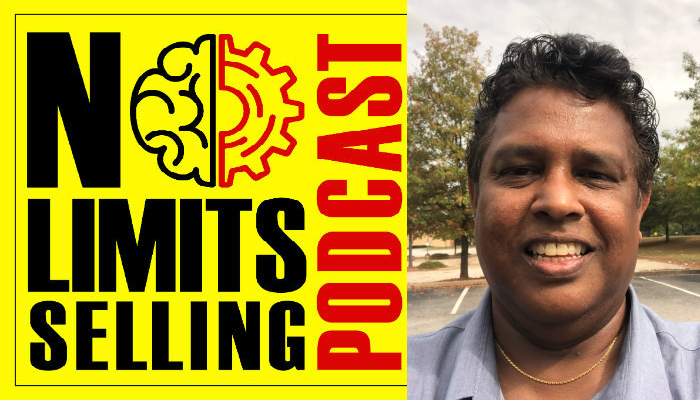4 Steps to Build The Right Mindset by Paul Thevarajoo
On Episode 130 of The No Limits Selling Podcast, we have Paul Thevarajoo, 20+ years in sales & 12 years in sales training. Worked across various business channels to provide innovation coaching and training. His coaching techniques has the ability to transcend many ethnic and cultural barriers.
In this episode, Paul teaches how to build the right mindset in 4 steps.

Contact Paul:
[EDITOR’S NOTE: This podcast is sponsored by No Limits Selling. It is a fun, fast-paced podcast that delivers hard-fought business advice that you can implement today to improve your sales and performance]
Interested In Our Real Estate Coaching Services? Explore Our Website: Link
Feeling Not Well Today? You Can Use Our Mindset Boosters App To amp Up Your Mood: Link
Find us on Social Media:
LinkedIn | Facebook community | Instagram
Like what do you listen to? Subscribe to our podcast!
Ready to become fearless? We can help you become fearless in 60 days so you accomplish more in your career Schedule A 15 min Call with Umar
Summary
Introduction and Background
The podcast begins with an introduction of Paul Thevarajoo, a sales trainer at Atlantic Broadband. Paul shares his background and experience in sales, discussing how he got into the field and the lessons he learned along the way.
Adapting to Change to Build the Right Mindset
Paul talks about the challenges that arose due to the pandemic, particularly the shift to virtual meetings and sales calls. He emphasizes the importance of adapting to these changes and finding ways to build rapport with customers virtually to build the right mindset. He also discusses the need for salespeople to change their mindset and approach to accommodate this new environment.
Building Rapport Virtually
One of the key topics discussed is how to build the right mindset by building rapport in a virtual setting. Paul suggests that salespeople can still create the same level of connection and understanding with their customers over video conferencing as they would in person. He also mentions that these virtual meetings can sometimes be more focused and efficient, as they require a certain level of intentionality and agenda-setting.
Overcoming Resistance to Change
Paul shares an anecdote about a sales rep who was initially resistant to the changes brought about by the pandemic. However, after trying out the new methods and seeing positive results, the rep was able to embrace the changes. This story highlights the importance of being open to new approaches and the potential benefits they can bring.
Maintaining Team Connection and Camaraderie
Despite the shift to remote work, Paul emphasizes the importance of maintaining team connection and camaraderie. He mentions hosting virtual happy hours and other activities to foster a sense of community among the team. He also discusses the increased collaboration and cross-communication between different teams spread across the eastern seaboard.
Conclusion
In conclusion, the podcast episode with Paul Thevarajoo, a sales trainer at Atlantic Broadband, centers around the theme of adaptability in sales, particularly in the face of the pandemic-induced shift to virtual interactions. Paul shares his insights on the importance of building rapport with customers in a virtual setting, overcoming resistance to change, and maintaining team camaraderie despite remote work. He also shares a compelling anecdote about a sales rep who successfully embraced these changes.
Looking forward, Paul envisions a future where sales interactions are a blend of virtual and face-to-face meetings, emphasizing the need for salespeople to be adept at both. The episode serves as a testament to build the right mindset to develop the resilience and adaptability required in the sales industry, especially during challenging times.
Questions & Answers
What are the key takeaways from the podcast with sales trainer Paul Thevarajoo?
How can salespeople build rapport with customers in a virtual setting according to Paul Thevarajoo?
What advice does Paul Thevarajoo give for overcoming resistance to change in sales?
How does Paul Thevarajoo suggest maintaining team camaraderie in remote work settings?
What does the future of sales look like according to Paul Thevarajoo?
Who is Paul Thevarajoo and what can we learn from his experiences in sales?
Don’t miss this opportunity to transform your real estate career with one-on-one coaching. As an experienced real estate coach, I, Umar Hameed, am dedicated to helping you unlock your full potential and achieve your real estate goals. To learn more about who am I and my clients ↓
If you’re ready to take the next step, book an appointment with me today and begin your journey toward success in the real estate industry.
